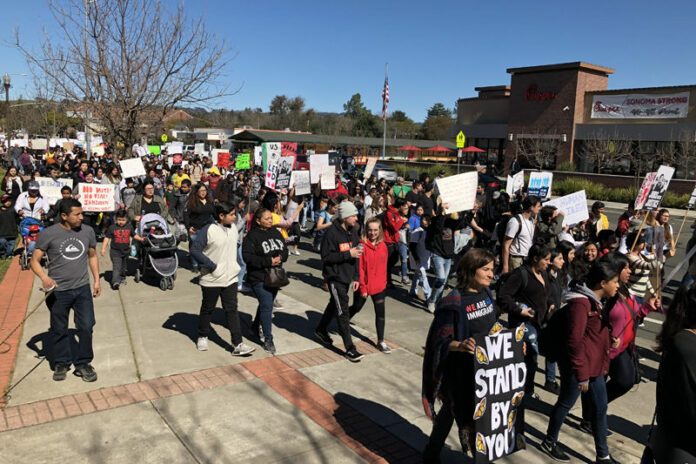March 5 was to be the end of the Deferred Action for Childhood Immigrants (DACA) program and the deadline for congress to come up with a legislative solution for young undocumented immigrants. Neither of those objectives has come to pass.
Multiple federal judges, including Judge William Alsup of the U.S. District Court for the Northern District of California, ruled against the Trump administration’s reasoning to terminate the program and instead ordered the Department of Homeland Security to resume renewal of all existing DACA permits.
On Feb. 26 the Supreme Court declined to hear the Trump administration’s request to bypass the ruling of the federal judges, effectively extending the DACA deadline.
While the rulings have put a pause on efforts to end DACA, those “Dreamers” who are enrolled in the government program are left in limbo.
At a protest march in Santa Rosa on March 5, hundreds of students and supporters gathered at Santa Rosa Junior College. Jesus Martinez, 16, held up a sign reading, “Let Us Dream.”
Martinez said he moved to the U.S. from Patzcuaro, Mexico when he was five. Through the DACA program he gained his work permit. Martinez said he attended the rally in support of people like him, who want to feel safe and don’t want to suffer.
Teresa Marcelino, Immigration Program Coordinator for Catholic Charities in Santa Rosa, said the clients she works with are afraid and anxious about what could come next.
“They have better jobs, some are enrolled in college,” Marcelino said. “After they lose their work permit, what’s going to happen?”
DACA is a government program to defer deportation for individuals born after June 15, 1981, who came to the US before age 16, and who meet several other guidelines. It allows them to obtain a driver’s license and work permit.
According to the National Immigration Law Center, the program started June 2012 when the U.S. Department of Homeland Security announced that it would not deport certain undocumented youth who came to the United States as children. Under a directive from the DHS secretary, these youth may be granted a type of temporary permission to stay in the U.S. called “deferred action.” The Obama administration called this program Deferred Action for Childhood Arrivals or DACA.
On September 5, 2017, U.S. Attorney General Jeff Sessions, on behalf of the Trump administration, announced the end of the DACA program. The announcement left thousands scrambling to figure out how and when to renew their applications. At the time of the announcement, there were almost 700,000 registered DACA recipients, according to DHS. California and Texas are the states with the largest number of DACA recipients, holding 42 percent of all approved DACA applicants.
Marcelino said recipients gain work permits that are good for two years and must renew six months prior to the expiration date. Each renewal is $495. For large families applying for renewal every year-and-a-half for each child, costs can quickly add up.
Marcelino said Catholic Charities of Santa Rosa is continuing to help with the renewal process and with the application fees.
In Sept. 2017, the Sonoma County Board of Supervisors adopted a resolution to affirm the County’s commitment to protect and support Deferred Action for Childhood Arrivals Program (DACA) recipients and all immigrant community members in Sonoma County. This action seeks to relieve the fear and anxiety resulting from the memorandum issued by the Department of Homeland Security on September 5, 2017, to rescind the DACA Program. Additionally, the board recommended aiding local recipients with the $495 renewal fee.
“Our local undocumented residents are under assault by the federal government,” said Sonoma County Board of Supervisors Chairwoman Shirlee Zane. “Rescinding DACA threatens the health and safety of the 6,000 DACA-eligible individuals in Sonoma County, 4,000 of whom are K-12 students. Despite these changes, we want you to know we are here to protect our immigrant community, provide families with essential services and support, and are urging our federal representatives to develop and pass comprehensive immigration reform legislation.”
According to U.S. Citizenship and Immigration Services, between August 2012 and March 2017, USCIS accepted 886,814 applications for initial DACA, and 787,580 were approved. Between June 2014 and March 2017, 884,661 DACA renewal applications were accepted, and 799,077 were approved.
The top ten countries of origin of DACA recipients are Mexico, El Salvador, Guatemala, Honduras, Peru, South Korea, Brazil, Ecuador, Colombia, and the Philippines.









